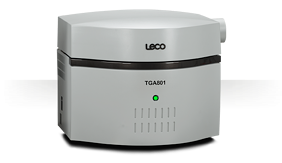The TGA801 thermogravimetric analyzer and its predecessors can accommodate far more than organic material measurements.
Its ability to handle large, gram-sized samples has seen the TGA801 become an indispensable part of many industrial by-product monitoring processes, including the analysis of flue-gas desulfurization (FGD) solids.

Image Credit: LECO Corporation
Limestone forced oxidation scrubbers (LSFO) and other FGD systems are employed in the oxidization of sulfur dioxide from flue gases prior to these being passed through absorbers designed to remove contaminants from industrial emissions.
The removal of these contaminants helps minimize scaling problems in the absorbers, therefore enhancing their availability and lifespan. These scrubbers confer the added benefit of generating solid by-products that can be retailed due to their own potential applications.
LSFOs are the most commonly utilized wet FGD technology process. These devices used forced oxidation to remove up to 95% of SO2, precipitating this as gypsum (CaSO4•2H2O).
Gypsum can be sold to a range of industries, including manufacturers of wallboard and cement manufacturers, or agricultural companies. Even the lowest quality gypsum can be landfilled, meaning this is easier to dispose of than the original sulfur dioxide.

Image Credit: LECO Corporation
The potential retail applications of gypsum are dependent on its quality. For example, wallboard-grade gypsum requires that solids be 96% gypsum.
It is, therefore, vital to accurately measure gypsum’s makeup during production.
A macro thermogravimetric analyzer (TGA) such as the TGA801 from LECO offers measurement of a full gram of sample. This feature allows for reduced sample preparation and improved accuracy compared to micro TGAs, which can only accommodate sample sizes up to 50 mg.
The TGA801 is also able to simultaneously analyze up to 19 samples, enabling significant productivity boosts in terms of a laboratory’s capacity to determine sample quality.
The TGA family’s precision and accuracy when measuring these types of FGD solids have been lab-tested a number of times over several years.
For example, an analysis published by ASTM in 2017 saw LECO’s experts working in collaboration with Western Kentucky University to showcase the effectiveness of the TGA701 (the TGA801’s predecessor) and its capacity to accurately characterize FGD solids produced by LSFOs.

This information has been sourced, reviewed and adapted from materials provided by LECO Corporation.
For more information on this source, please visit LECO Corporation.